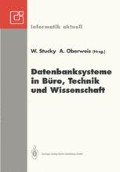Abstract
The deep complexity of uncertain data modelling has resisted to general solutions so far. Instead, a diversity of modelling approaches has been proposed over the years, but few systems actually have been built. The DUCK calculus is one recent ambitious rule-based attempt to model uncertainty on the grounds of established probability theory as typically used e.g. in medical diagnosis. This paper describes how deductive database technology can be exploited for prototyping of a system for uncertain reasoning.
In particular we discuss the issues of ADT-ideas in Datalog by using interpreted predicates. Moreover we show that for safety reasons logic programming and current Datalog optimizers must be upgraded to deal with semantic optimization in form of subsumption. New differential least fixpoint operators, customized for subsumption optimization, are provided. Finally we outline the design and implementation of DUCK-Demonstrator/1.1 which serves as a research vehicle for ongoing studies of uncertain reasoning phenomena and for optimization of vague queries.
Access this chapter
Tax calculation will be finalised at checkout
Purchases are for personal use only
Preview
Unable to display preview. Download preview PDF.
References
Stig K. Andersen, Kristian G. Olesen, Finn V. Jensen, and Frank Jensen. HUGIN — a shell for building Bayesian belief universes for expert systems. In Proc. of the 11 th IJCAI, pages 1080–1085, Detroit, MI, 1989.
S. Andreassen, M. Woldbye, B. Falck, and S. K. Andersen. MUNIN — a causal probabilistic network for interpretation of electromyographic findings. In Proc. of the 10 th IJCAI, pages 366–372, Milan, Italy, 1987.
Fahiem Bacchus. Representing and Reasoning with Probabilistic Knowledge: a logical approach. The MIT Press, Cambridge (USA ), 1990.
F. Bancilhon and S. Khoshafian. A calculus for complex objects. Journal of Computer and System Sciences, 38: 326–340, 1989.
U.S. Chakravarthy, J. Grant, and J. Minker. Foundations of semantic query optimization for deductive databases. In J. Minker, editor, Foundations of Deductive Databases and Logic Programming, pages 243–274. Morgan Kaufmann, Los Altos, 1988.
Gregory F. Cooper. The computational complexity of probabilistic inference using Bayesian networks. Artificial Intelligence, 42: 393–405, 1990.
Ronald Fagin and Joseph Y. Halpern. Uncertainty, belief, and probability. Computational Intelligence, 7 (3): 160–173, 1991.
Ulrich Güntzer, Werner Kießling, and Rudolf Bayer. On the evaluation of recursion in (deductive) database systems by efficient differential fixpoint iteration. In Proceedings of the 3’ d International Conference on Data Engineering, pages 120–129, Los Angeles, California, 1987.
Ulrich Güntzer, Werner Kießling, and Helmut Thöne. New directions for uncertainty reasoning in deductive databases. In Proceedings ACM SIGMOD International Conference on Management of Data, pages 178–187, Denver, USA, 1991.
Werner Kießling, Gerhard Köstler, and Ulrich Güntzer. Fixpoint evaluation with subsumption for probabilistic uncertainty. Technical Report TUM-19237, Fakultät für Informatik, Technische Universität München, Dec. 1992.
Rudolf Kruse, Erhard Schwecke, and Jochen Heinsohn. Uncertainty and Vagueness in Knowledge Based Systems. Artificial Intelligence. Springer, Berlin, 1991.
Werner Kießling, Helmut Thöne, and Ulrich Güntzer. Database support for problematic knowledge. In Proc. Int. Conf. on Extending Database Technology (EDBT), pages 421436, Vienna, Austria, 1992.
Database systems: Achievements and opportunities. In Lagunita Beach Report of the NSF Invitational Workshop on Future Directions in DBMS Research, Palo Alto, 1990.
R.T. Ng and V.S. Subrahmanian. Empirical probabilities in monadic deductive databases. In 8th Conference on Uncertainty in Artificial Intelligence, pages 215–222, Stanford, USA, 1992.
S. Naqvi and S. Tsur. A Logical Language for Data and Knowledge Bases. Computer Science Press, New York, 1989.
Judea Pearl. Probabilistic Reasoning in Intelligent Systems. Morgan Kaufmann, San Mateo, 1988.
Heribert Schütz. R-Lisp eine erweiterte relationale Algebra in Lisp. Technical Report TUM-I9049, Institut für Informatik, Technische Universität München, 1990.
David J. Spiegelhalter. Probabilistic reasoning in predicitive expert systems. In L.N. Kanal and J.F. Lemmer, editors, Uncertainty in Artificial Intelligence, pages 47–68. Elsevier Science Publishers B.V. ( North-Holland ), 1986.
H. Schmidt, N. Steger, U. Güntzer, W. Kießling, R. Azone, and R. Bayer. Combining deduction by certainty with the power of magic. In Proceedings l’t International Conference on Deductive and Object-Oriented Databases, pages 205–224, Kyoto, Japan, 1989.
Y. Sagiv and M. Y. Vardi. Safety of datalog queries over infinite databases. In Proceedings ACM SIGACT-SIGART-SIGMOD Symposium on Principles of Database Systems, pages 160–171, Philadelphia, USA, 1989.
Helmut Thöne, Ulrich Giintzer, and Werner Kießling. Towards precision of probabilistic bounds propagation. In 8th Conference on Uncertainty in Artificial Intelligence, pages 315–322, Stanford, USA, 1992.
J. Ullman. Principles of Database and Knowledge-Base Systems, volume 1,2. Computer Science Press, New York, 1988, 1989.
Uncertainty in information systems: From needs to solutions. In UMIS, Two-Meeting Invitational Workshop, Palma de Mallorca, Sept. 1992.
M. von Rimscha. The determination of comparative and lower probability. In Workshop Uncertainty in Knowledge-Based Systems, FAW-B-90025,volume 2, pages 344–376, Ulm, Germany, 1990. FAW Ulm.
Author information
Authors and Affiliations
Editor information
Editors and Affiliations
Rights and permissions
Copyright information
© 1993 Springer-Verlag Berlin Heidelberg
About this paper
Cite this paper
Kießling, W., Köstler, G., Güntzer, U. (1993). Fixpoint Evaluation with Subsumption for Probabilistic Uncertainty. In: Stucky, W., Oberweis, A. (eds) Datenbanksysteme in Büro, Technik und Wissenschaft. Informatik aktuell. Springer, Berlin, Heidelberg. https://doi.org/10.1007/978-3-642-86096-6_22
Download citation
DOI: https://doi.org/10.1007/978-3-642-86096-6_22
Publisher Name: Springer, Berlin, Heidelberg
Print ISBN: 978-3-540-56487-4
Online ISBN: 978-3-642-86096-6
eBook Packages: Springer Book Archive

